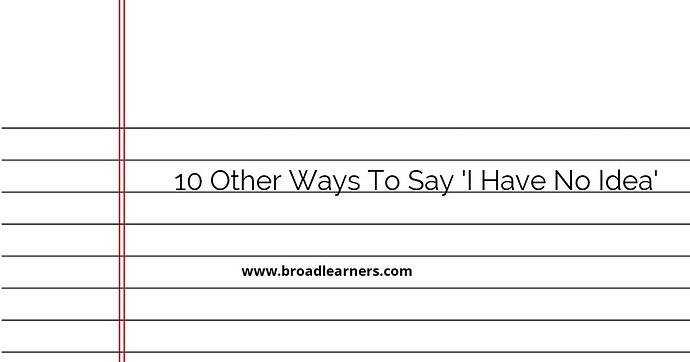When someone asks you a question and you don't know the answer, saying 'I have no idea' may not always be the most appropriate or professional response. Luckily, there are several alternative phrases you can use to convey the same meaning while sounding more polite or diplomatic. Here are 10 other ways to say 'I have no idea':
- I'm not sure
- I don't have the answer
- I'm unsure
- I'm not knowledgeable on that topic
- I'm afraid I can't help you with that
- I'm not familiar with that
- I don't have any information on that
- I'm sorry, I can't provide an answer
- I'm clueless
- I'm not the best person to ask about that
Let's take a closer look at each alternative with some examples:
1. I'm not sure
This phrase is a more general way to express uncertainty or lack of knowledge. It's a polite way to say you don't have the answer.
Example:
Person A: Do you know where the nearest post office is?
Person B: I'm not sure, but I think there's one downtown.
2. I don't have the answer
This straightforward statement acknowledges that you don't possess the information being asked for.
Example:
Person A: What's the capital of Australia?
Person B: I'm sorry, I don't have the answer.
3. I'm unsure
Using 'I'm unsure' indicates that you lack confidence in your knowledge or have doubts about the topic.
Example:
Person A: Can you tell me how to solve this math problem?
Person B: I'm unsure, but I can try to help you figure it out.
4. I'm not knowledgeable on that topic
This phrase conveys that you don't possess the necessary knowledge or expertise in the specific subject matter.
Example:
Person A: What are the latest advancements in quantum physics?
Person B: I'm not knowledgeable on that topic, but I can recommend some resources for you to learn more.
5. I'm afraid I can't help you with that
Using 'I'm afraid I can't help you with that' shows regret that you're unable to provide the requested information.
Example:
Person A: Do you know how to fix a leaky faucet?
Person B: I'm afraid I can't help you with that. You might want to call a plumber.
6. I'm not familiar with that
This phrase implies that you lack familiarity or knowledge about the specific subject or topic.
Example:
Person A: Have you seen the latest movie that just came out?
Person B: I'm sorry, I'm not familiar with that movie.
7. I don't have any information on that
Using 'I don't have any information on that' communicates that you don't possess any relevant data or knowledge on the given topic.
Example:
Person A: Can you provide me with statistics on global warming?
Person B: I'm sorry, I don't have any information on that. You might want to check reputable scientific sources.
8. I'm sorry, I can't provide an answer
This apology acknowledges your inability to give a response or answer to the question.
Example:
Person A: What's the best way to learn a new language?
Person B: I'm sorry, I can't provide an answer. Different methods work for different people.
9. I'm clueless
This more informal phrase humorously conveys that you have absolutely no idea or knowledge about the topic.
Example:
Person A: Can you explain the theory of relativity to me?
Person B: I'm clueless, but I'm sure there are plenty of books and resources to help you understand it.
10. I'm not the best person to ask about that
This phrase indicates that you may not have the expertise or experience to provide a satisfactory answer.
Example:
Person A: Do you know how to fix a car engine?
Person B: I'm not the best person to ask about that. You might want to consult a mechanic.
By using these alternative phrases, you can avoid sounding dismissive or unhelpful when you don't have the answer to a question. Remember to choose the phrase that suits the context and maintain a polite and respectful tone.
Did I miss anything? Respond below
